
Lorch am Rhein is a small town in the Rheingau-Taunus-Kreis in the Regierungsbezirk of Darmstadt in Hesse, Germany. It belongs to the Rhine Gorge World Heritage Site.

The Holy Cross Church is a Catholic church in the Bornheim district of Frankfurt am Main (Germany). It is similar in design to the Frauenfriedenskirche in Frankfurt-Bockenheim. It was built by Martin Weber from 1928 to 1929, on a rise then known as Bornheimer Hang. The church is an unusual example of interwar modernism as sacred Bauhaus architecture.

St. Martin is the name of a Catholic parish and church in Idstein, Rheingau-Taunus-Kreis, Germany. The official name of the church is Katholische Pfarrkirche St. Martin. The name of the parish became St. Martin Idsteiner Land on 1 January 2017, when it was merged with five other parishes. The parish is part of the Diocese of Limburg.
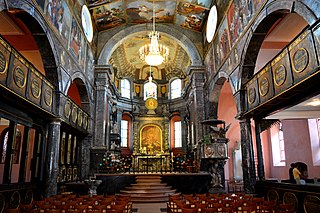
The Unionskirche is the active Protestant parish church of Idstein, a town in the Rheingau-Taunus district in the German state of Hesse. Idstein was a residence of the counts of Nassau. The church building in the center of the historic Altstadt dates back to the 14th century when it was built as a collegiate church. It became Lutheran during the Reformation. Its interior was adapted in the 17th century to become a Lutheran Predigt- und Hofkirche. The most prominent decoration in the church is the series of 38 paintings by the Flemish painter Michael Angelo Immenraedt, an exponent of Flemish Baroque painting, and others. They follow a program of biblical scenes.

The Church of Saints Nicholas is an early Baroque parish church located in the Güns Valley in Lockenhaus, in the Austrian state of Burgenland. It was built during the period of 1655 to 1669. Commissioned by Franz III. Nádasdy, the church was entrusted to the Augustinians and was dedicated to both St. Nicholas of Myra and St. Nicholas of Tonentino, in reference to the role of Fr. Nicholas Donellan (O.E.S.A) in Nädasdy's conversion to the Catholic faith. The parish church overlooks the town's main square.

Rheingauer Dom is the colloquial name for the Catholic parish church in Geisenheim, Germany. Officially Pfarrkirche Heilig Kreuz, the large church in the Rheingau region is called Dom although it was never a bishop's seat. The present building was begun in the 16th century, but major features such as an expansion of the nave from three to five vaults, the towers, the organ and several altars were added in the 19th century. The parish is part of the Diocese of Limburg.

St. Valentin is the common name for the Catholic parish church and Basilica minor Basilica of SS Dionysius and Valentinus in Kiedrich in the Rheingau, in Hesse, Germany. It was built at the end of the 15th century in the Gothic style. Its organ is one of the oldest playable organs in Germany. The church was a pilgrimage destination for people with epilepsy and therefore has notable carved wooden laity stalls, including one decorated with the "Gerechtigkeitsspirale".

St. Jakobus is a Catholic church and a former parish in Rüdesheim am Rhein, Hesse, Germany. It dates back to the 10th century, was expanded around 1400, and again in 1913/14. The church was severely damaged by bombing in World War II, and rebuilt from 1947 to 1956. It is a listed historic monument and serves also as a concert venue.
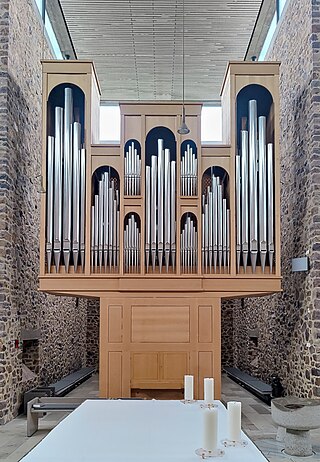
Orgelbau Mebold is a company building pipe organs in Siegen, Germany. It was founded in 1967 by Hans Peter Mebold, and has been run since 2018 by his son Mathias Mebold. The company builds new organs, restores historic instruments, and specializes in portable small instruments (Truhenorgel).

The so-called Saardom in Dillingen/Saar is one of the largest sacred buildings in Saarland. It is the parish church of the parish of St Sacrament. The parish belongs to the parish community of the Holy Sacrament, St John the Baptist in Dillingen, St Joseph and St Wendelin in Diefflen, St Maximin in Pachten, and St Mary consolation of the saddeneds on the Pachtener Heide. The church belongs to the Roman Catholic Diocese of Trier. The feast of dedication is the Solemnity of the Most Holy Body and Blood of Christ.

The cathedral Maria Himmelfahrt is the parish church of the South Tyrolean capital Bolzano and cathedral of the Roman Catholic Diocese of Bozen-Brixen. While the Bishop has resided in Bozen since 1964, the cathedra and the cathedral chapter remain in Brixen. Maria Himmelfahrt is therefore with Brixen Cathedral co-cathedral of the diocese.
Hans Steinlein was a German sculptor of religious art who, from his studio in Eltville am Rhein, made a number of important altars and other objects for churches in the Saarland area.

St. Nikolaus von Flüe is the name of a Catholic church in Wörsdorf, part of Idstein, Rheingau-Taunus-Kreis, Germany. The official name of the church is Katholische Pfarrkirche St. Nikolaus von Flüe. When it was dedicated, the name was St. Nikolaus-von-Flüe-Friedenskirche, designating it as a peace church. The Wörsdorf parish belongs to St. Martin Idsteiner Land. The church, the first Catholic church in Wörsdorf, was designed by Johannes Krahn, and consecrated in December 1962.
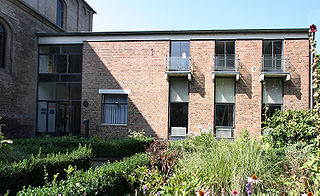
Karl Friedrich Heinrich Band was a German architect.
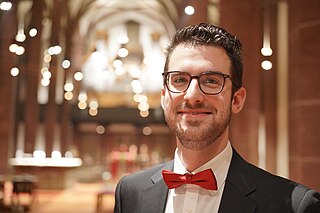
Johannes M. Schröder is a German organist, composer and Catholic church musician. After several years responsible for the church music at the Westerwälder Dom, he moved to St. Bonifatius, Wiesbaden. He is also a lecturer and a music editor.

St. Sylvester is a Catholic church and parish in Schwabing, now part of Munich, in the German state (Bundesland) of Bavaria. It began with a village church in the 14th century, first documented in 1315, and dedicated to John the Baptist. A Gothic church was remodelled in Baroque style in the 17th century, and received furnishings such as sculpture attributed to Ignaz Günther or his school.
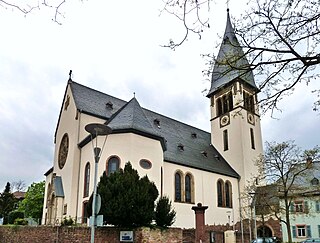
St. Martinus is a Catholic church and parish in Hattersheim am Main, Main-Taunus-Kreis, Hesse, Germany. It belongs to the Diocese of Limburg. The present church was built by Ludwig Becker in Romanesque revival style with allusions to Jugendstil, completed in 1915. He incorporated features from the earlier Baroque building.

St. Bonifatius is a Catholic church in Lorchhausen, part of Lorch, Hesse, Germany. The large church in Gothic revival style was completed in 1879.
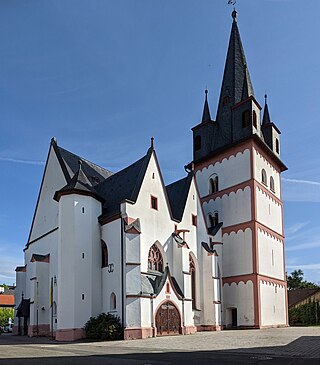
St. Martin is the name of a Catholic church and former parish in Oestrich, Rheingau-Taunus-Kreis, Germany. It was built as a hall church from 1508 in late-Gothic style. It was destroyed in the Thirty Years' War and rebuilt in simpler style, but restored to its Gothic appearance in 1894.























